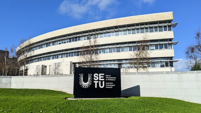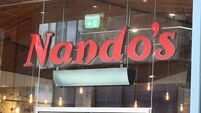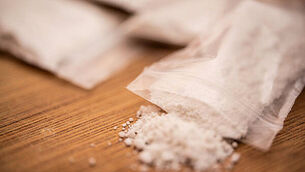What Gerry Adams said during seven days of evidence in BBC defamation trial
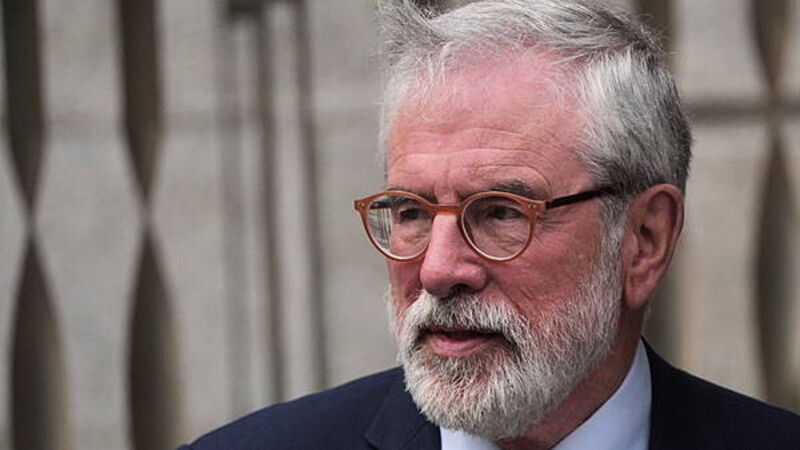
By Jonathan McCambridge, PA
For seven days, Gerry Adams took his place in the witness box in the tiny Court 24, just a few feet from where lawyers and journalists crammed on to the narrow wooden benches.
The jury at the High Court in Dublin heard hours of evidence from the former Sinn Féin leader. His testimony was wide-ranging, including a lengthy account of his early years and political awakenings. At times he became emotional as he recalled past events.
Mr Adams’ arrival at the Four Courts caused a stir each morning. The posse of media cameras was always there to meet him and he was greeted by the occasional well-wisher at the gates of the court.
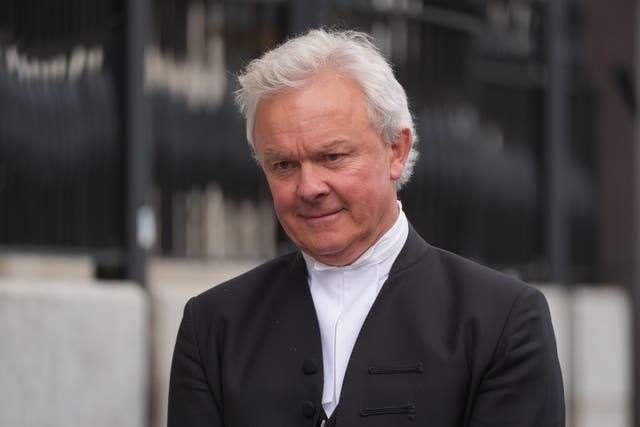
However, inside there were fewer pleasantries as the 67-year-old faced days of tense questioning by a barrister for the BBC, probing the senior republican’s recollection around a series of IRA atrocities.
The marathon evidence session began on the afternoon of the first day of the defamation case as the former MP, MLA and TD was invited by his own barrister, Declan Doyle SC, to tell the jury about his upbringing during a time of turmoil on the streets of Belfast.
Trial judge Mr Justice Alexander Owens indulged the reminiscences to an extent before gently urging Mr Doyle to quicken his pace of questioning.
Describing political and civil developments in the 1970s and 1980s, Mr Adams said: “I do think the IRA was a legitimate response to what was happening at the time.”
Soon attention turned to the Spotlight programme that led Mr Adams to sue the BBC over allegation that he sanctioned the 2006 murder of Denis Donaldson, a Sinn Féin official who had been exposed as a spy.
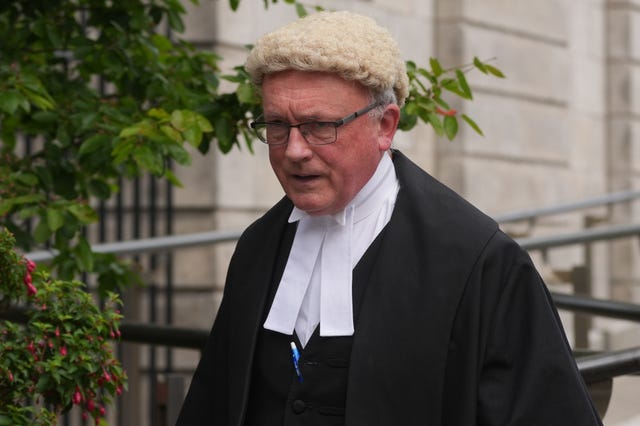
Mr Adams told the court he remembered watching the programme and being “astonished” at what he called “an attempted hatchet job” and “bad, poor journalism”.
He described the BBC response when he attempted to raise a complaint as arrogant and insulting.
He said: “This is a public broadcaster. The public pay for all of this.
“They just dismissed it [the complaint], it was offensive, it was insulting and it is what has all of us here today.”
The tone of questioning changed dramatically at the end of the first week of the trial when Paul Gallagher SC, acting for the BBC, began his cross-examination of the former Sinn Fein president. The courtroom was packed as Ireland’s former attorney general rose to commence the questioning.
His direction became clear at once when Mr Gallagher asked Mr Adams how many people had been killed in the Troubles and how many were victims of the IRA.
“A lot – what has this got to do with the Spotlight programme?” Mr Adams responded.
The barrister listed some of the most infamous episodes of the North’s past – Bloody Friday, the Claudy bombings, La Mon – and asked Mr Adams how many victims were killed in each.
Mr Adams responded that it was not fair to ask him to remember every death that occurred, adding: “You’re trivialising those deaths, if you don’t mind me saying so.”
As the line of questioning continued into the second week of the trial, Mr Adams complained that an attempt was being made to “smother” the jury in history.
He repeatedly said he would not speculate when asked about members, structures or rules of the IRA.
“What on earth has this got to do with Denis Donaldson?” Mr Adams asked on several occasions as the cross-examination went on.
Under questioning, the former Sinn Féin leader said: “I have never resiled from my view that the IRA’s campaign, whatever about elements of it, was a legitimate response to military occupation.”
He told the jury that IRA membership “wasn’t a path that I took”, saying he instead joined Sinn Féin, adding that the republican party “was not the political wing of any organisation”.
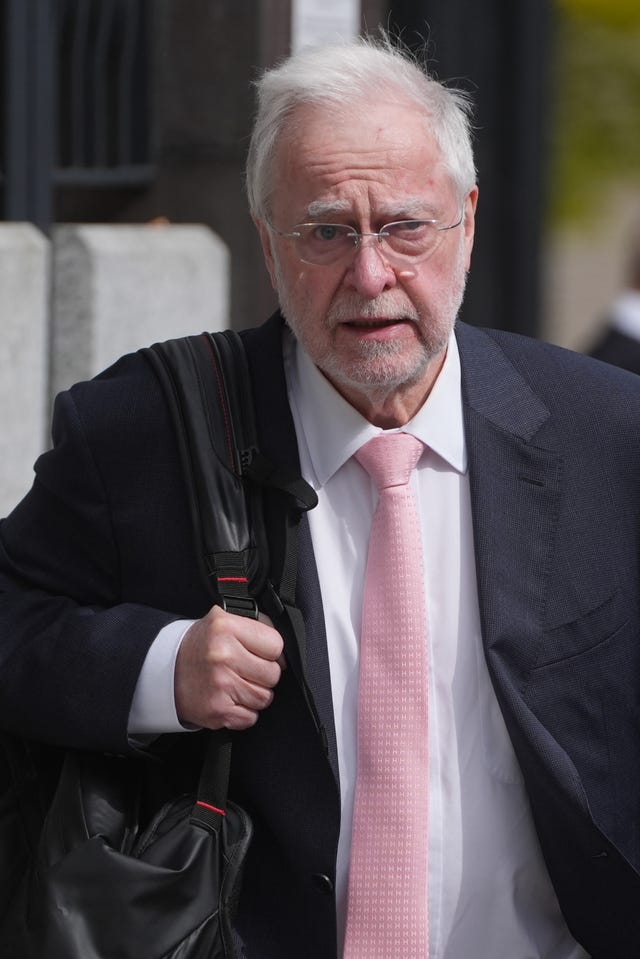
He conceded that claims about about him being a member of the Army Council of the IRA had been raised multiple times in public. He said he had repeatedly received legal advice that he would “not get any sort of a fair hearing” to challenge various claims made about him in the press.
At one point Mr Adams turned the questioning on Mr Gallagher: “Why are you trying to persuade the jury I have no reputation whatsoever?”
Mr Adams said the Spotlight programme suggested his work to end violence in Northern Ireland “was a scam” and he considered this to be a “lie” and “grievous smear”.
On his final day of questioning, it was put to Mr Adams that he had carried the coffins of prominent IRA members during their funerals.
He replied: “You’re trying to persuade this jury I had no reputation whatsoever because I attended funerals?
“And therefore Spotlight could say whatever they want about me and I would have no redress?”
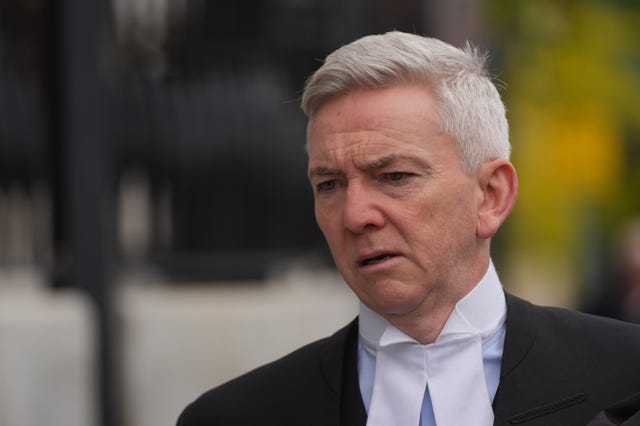
Asked by the judge for his reflections on the IRA’s campaign of violence, Mr Adams added: “My big regret is that so many people were killed and particularly civilians.
“My abiding regret is that it took so long to get a peace process together.”
The questioning concluded.
The jury had heard Mr Adams’ legal team describe his reputation as that of a peacemaker. The BBC barristers argued that it was “universally held” that he had a reputation of being in the IRA and on its Army Council.
The former Sinn Féin president’s barrister Tom Hogan SC summed up the paradox when he said: “To some he is a hero, to some he is not.”
How the BBC defended its journalism
The BBC Spotlight team argued it took “care” in broadcasting the allegation that Mr Adams sanctioned the killing of Mr Donaldson.
They argued that Mr Adams' reputation was not harmed by the allegation as he was widely considered to have been a member of the IRA and its Army Council.
Mr Adams denies ever being in the IRA and said on the stand that it was “not a path that I took”.
The Spotlight programme, aired in September 2016, included a claim from an anonymous source referred to as “Martin” that the shooting of Denis Donaldson in 2006 was sanctioned by the IRA leadership and that Mr Adams “gives the final say”.
Mr Donaldson was killed in Co Donegal months after admitting his role as a police and MI5 agent.
The BBC argued that airing allegations responsibly was a central tenet of journalism.
It stressed that it was an allegation that was made, and not a statement of fact, that Mr Adams had sanctioned and approved the killing.

The broadcaster said that after the allegation, they aired Mr Adams’ denial, the claim of responsibility by the Real IRA and the progress of the Garda investigation.
BBC barrister Paul Gallagher SC said the case was taken by Mr Adams on the misunderstanding that the allegation was only based on one source.
Spotlight reporter Jennifer O’Leary gave evidence that the allegation was corroborated by five other sources.
She said she was on the road for months after the source “Martin” made the allegation in a recorded interview in April 2016, and held 60 different meetings with sources in the months after.
Ms O’Leary said she took “care” and was “responsible” with the allegation and said she wanted to be “fair” to Mr Adams by being selective in who she asked to corroborate the allegation.
During the High Court case, she said she wanted to be “fair” to Mr Adams, by putting the allegation to sources with experience in the IRA or who had access to intelligence at the time of Mr Donaldson’s killing.
She said that she wanted to put it to people who had been reliable sources before and said because of this, she did not include one particular garda source as corroboration because she had not used them before.
Ms O’Leary said she took the “utmost care” with the allegation and denied leaving out pieces of information from the programme that would contradict the claim against Mr Adams.
BBC Spotlight editor Gwyneth Jones gave evidence that they did not treat the claim like a “big sensationalist expose” and said the tone was “measured” and the language “precise”.
“There was so much care taken over this programme. It was a solid piece of journalism and the result of many months work and a lot of diligence and a lot of rigour and a lot of scrutiny,” she said.
In his closing statement, Mr Gallagher told the jury that Mr Adams could not say his reputation had been harmed by the programme if his reputation was of being a member of an organisation that “held this country and the North as a hostage for three decades”.
“Are we to say nothing about that? Mr Adams would like us to say nothing.”

